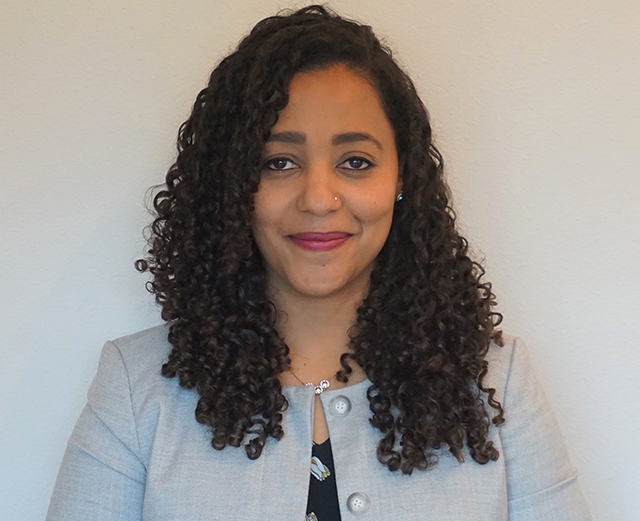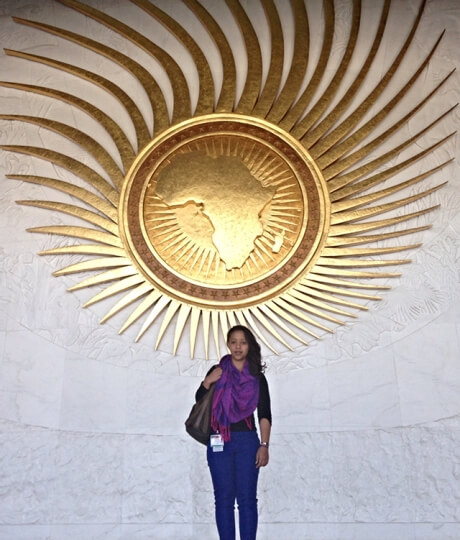Quantum computing is poised to transform the world. Suhare Nur wants to ensure that when this next tech revolution arrives, the world is ready.
As Global Lead for Commercial Alliances at IBM Quantum, Nur works with clients to help them understand how quantum computing could disrupt their industry, and what it means for them. Then she helps them get up to speed on the groundbreaking technology.
Unlike classical computers, which use long strings of binary digits, quantum computers utilize “quantum bits,” or qubits, that have unique properties which can provide an exponential increase in processing power. The technology could speed drug discovery, improve climate change models, and push artificial intelligence into overdrive.
“Even if the quantum computing revolution isn’t going to come for another few years, quantum computing is a fundamentally different way to do computing. So it is not a matter of just converting your code to make it quantum,” said Nur, who earned an applied physics Ph.D. in 2016 from the Harvard John A. Paulson School of Engineering and Applied Sciences and Graduate School of Arts and Sciences. “If you want to use quantum computers, you have to think in a completely different way in order to program them.”
It can be challenging to explain such complex physics concepts to individuals who come from a non-physics background, Nur said. She relies on the analytical skills and creativity she developed at SEAS to effectively tailor her work to the unique situation of each client.
The curiosity that has driven her since childhood remains one of her greatest assets.
Nur has been interested in science for as long as she can remember. She became fascinated by the way physics and chemistry could explain how the world works, so she double majored in the disciplines as an undergraduate at Houston Baptist University.
Curious about research, she enrolled in the Research Experience for Undergraduates program at Harvard. In collaboration with a postdoctoral fellow, she spent a summer studying how particles interact with each other within a colloidal mixture.
“That was really transformative for me. I got to carve out a little piece of research that I could own and drive myself,” she said. “Asking ‘why’ and then coming up with a structured approach to answer that question, and even just learning about the different resources that are available to get to that answer, is what was most exciting to me.”
Hooked on research, Nur decided to return to Harvard to pursue a Ph.D. in applied physics.
Nur at the African Materials Research Society (MRS) conference in 2013, where she presented her work on solid oxide fuel cells. (Photo provided by Suhare Nur)
In the lab of Shriram Ramanathan (who is now Professor of Materials Engineering at Purdue University), she researched solid oxide fuel cells, which are composed entirely of solid components on a silicon chip. Because they have no liquid components, these fuel cells could, in principle, be used to power computers or cell phones, providing a much cleaner source of power.
“The problem with solid oxide fuel cells is that they typically operate at very high temperatures, around 500 degrees Celsius, so you definitely couldn’t have one in your phone,” she said. “My research was to synthesize new materials that would allow us to operate these fuel cells at much lower temperatures.”
For Nur, the biggest challenge of the work was also the most exciting part of research—as she became the scientific authority on the new material she was synthesizing, she had to rely on herself to come up with solutions to problems.
“It was my responsibility to contribute to science and put my findings out there so the next person coming along can continue to push the field forward,” she said.
While Nur loved being immersed in science, she felt her impact could be amplified if she learned more about the world of business. So after earning her Ph.D., she joined the Boston Consulting Group as a management consultant.
She consulted on financial due diligence, strategy, and operations for firms in a number of different industries, and found the wide array of business challenges fascinating. Solving problems drew her in, and what she intended to be a one-year stint stretched to nearly three.
The interior of an IBM Quantum computing system. (Credit: IBM)
Eventually, she got involved in an exploration of the market opportunity for quantum computing. It was her first exposure to the field, and she was enthralled by the cutting-edge science and world-changing potential.
She wanted to dive deeper into this brave new world of computing, and joined Honeywell Quantum Solutions as a senior product manager to commercialize a first-of-its-kind quantum computer.
“To be a good product manager, especially with a technology this complex, you have to understand the technology itself; you have to understand its potential, but also its limitations,” she said. “At the same time, you have to put on your strategic hat and say, ‘this technology is novel and exciting, but does it make business sense for a company to invest in or use this technology today?’”
Now at IBM, Nur enjoys the educational aspects of her role. It is rewarding to walk a client through real-life examples of what a quantum solution would look like for their business, and see the lightbulb go off when they realize the technology’s potential, she said.
The variety of people she has the opportunity for work with, from startup founders to executives at multinational firms, from quantum theorists to business leaders, ensures that each day brings new puzzles to solve.
“The technology itself is remarkable, but the technology means nothing if the world isn’t able to understand or use it,” Nur said. “Helping clients experience that flip, from not knowing much about quantum computing to starting to understand its transformative potential, that is really rewarding.”
Press Contact
Adam Zewe | 617-496-5878 | azewe@seas.harvard.edu


